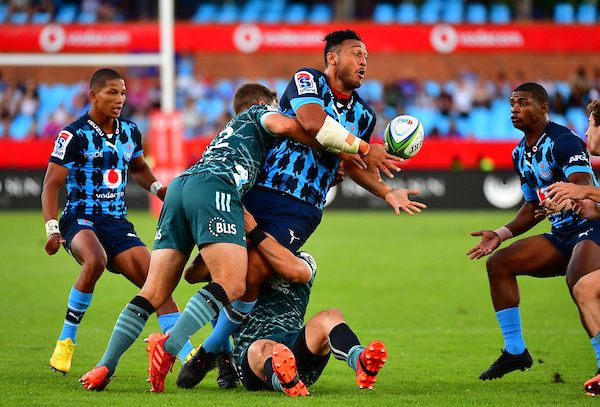

Chiefs' winger Emoni Narawa heads to the tryline against the Brumbies in their Super Rugby Pacific semi-final in Hamilton on Saturday.
Photo/Jeremy Ward/Photosport
Super Rugby: Debates on discipline, playoff formats and a need for variety among finalists
With Australian teams still struggling to secure playoff victories in New Zealand, the conversation turns to the future of the competition as the Crusaders-Chiefs set for epic final showdown.


Ōtautahi's 1 Drop Nation celebrates brotherhood and legacy in new music



Lineup for Miss Pacific almost complete after Fiji, PNG crown queens

Ōtautahi's 1 Drop Nation celebrates brotherhood and legacy in new music


We’re nearing the conclusion of Super Rugby Pacific 2025, with the grand final set to take place this weekend.
After 80 matches, including 16 rounds followed by playoff games, it has come down to this: The Crusaders will host the Chiefs on Saturday for the championship title.
In last weekend’s thrilling semi-finals, the Crusaders delivered an epic defensive stand to win 21-14 over the defending champions, the Blues, in Christchurch.
Despite the Blues’ numerous attempts - 38 phases to be exact - to score near the Crusaders’ goal line, the visitors couldn’t take the game into extra time. Thanks to Christian Lio-Willie, who dived on a loose ball just before the final whistle blew, to give the men in red and black their place in the final.
All Blacks superstar Will Jordan was outstanding for the Crusaders, scoring two tries to help his team get back in the game after trailing by 14 points for much of the first half.
The Blues, coming off a last-minute win over the Chiefs a week earlier, could not repeat the success this time.
Meanwhile, the Chiefs secured their place in the final by defeating the Brumbies 37-17 in Hamilton.
A standout from that match was Fijian flyer Emoni Narawa, who scored two tries, showcasing his speed and skill alongside team-mate Leroy Carter. Both are now strong contenders for selection in the All Blacks team for the upcoming Rugby Championships and Bledisloe Cup.
With the Crusaders and Chiefs moving on, it sets up an all-New Zealand final. No Australian team has ever won a Super Rugby playoff match in New Zealand, and that record continues. This is also the fourth season in which the Brumbies have been eliminated in the semi-finals as they sought to make it.
The Canberra club was attempting to become the first Australian team to win a playoff game in Aotearoa, but it was not to be, and the Kiwis are now 21-0. The Australians will turn their attention to next week’s naming of the Wallabies’ squad ahead of the British and Irish Lions series, which kicks off on 28 June.
But a key takeaway from the semi-finals is the issue of discipline: The Blues should be frustrated with their performance, as they lost the penalty count 16-9. Two yellow cards to Josh Fusitu’a and Hoskins Sotutu did not help, which put the Blues at a disadvantage during a critical time when they might have turned the game around.
Similarly, the Chiefs faced issues as well, with a yellow card to number 8 Tupou Vaa'i, which led to the Australians scoring the first try and dictating the pace of the game in the first half. The margin for error in test match rugby is extremely fine, as we saw in three of the All Blacks' four losses last year - yellows.
Super Rugby Pacific 2025 has seen some outstanding footy throughout the season, but there are some important questions, too: Only three teams, the Crusaders, Chiefs, and Blues, have reached the final in the last four years.
In fact, out of 12 playoff games since 2022, only one game involved a team other than these teams and the Brumbies. The earlier years of the tournament, 2011-2016, saw a more diverse set of teams reach the finals, sparking speculation about how the structure might need to change to attract more competition.
As fans eagerly await this weekend’s grand finale between two New Zealand teams, some experts speculate on increasing variety in future championships. They argue that changing existing teams or implementing a salary cap will not solve the issue.
The current playoff format is also a hot topic. Some believe it unfairly benefitted the Chiefs with a home semifinal despite losing their ‘quarter-final’. The Brumbies missed out on hosting their semi-final despite being strong contenders.
Other pundits describe the competition as quite extraordinary. Unlike many other international sporting leagues, such as the NBA, MLB, NHL, and even the NRL, there is no salary cap, which makes it tough for Australian teams to compete against a rugby powerhouse like New Zealand.
As we look forward to the grand final, the storyline continues to evolve - the same three to four teams will dominate Super Rugby.
Take a look at the rugby world champions, the Springboks: The Bulls were the only South African team to win Super Rugby in 2007, 2009, and 2010, before their departure a decade later. After being excluded from rugby’s premier club tournament in the southern hemisphere in 2020, South Africa decided to align its clubs with the northern hemisphere.
Their four biggest teams - the Bulls, Lions, Sharks, and Stormers - joined the PRO14, which has been renamed the United Rugby Championship (URC). Since then, South Africa has reached every final.
Springboks legend Schalk Burger argues that the URC is not as competitive as the Super Rugby competition he played in, but he believes it offers more advantages for South Africa.

Nafi Tuitavake, of the Bulls, during their 2020 Super Rugby game against the Highlanders at Loftus Versveld in Pretoria. Photo/File/Photosport
“The URC suits us with the player group we’ve got now. Super Rugby was a tough comp and we have really good squads, but this is a softer competition,” Burger told the Behind the Ruck podcast.
“This can come across as bad, but it doesn’t. Not every week is a high-intensity game or a make-or-break game. There are certain Welsh sides that are not strong enough to compete against us, especially at home.”
Burger also believes that South African clubs struggle to compete with the financial offers available in Europe and Japan, likely contributing to their lack of success.
This is why Burger believes that moving to the URC has benefited South Africa, adding that while many of their top players move abroad in search of lucrative contracts, each franchise has to reset their squad.
Burger also says the lower standard of competition allows the South African clubs to keep developing players while remaining competitive.